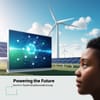Artificial intelligence is revolutionizing the renewable energy sector by optimizing energy production, forecasting demand, and managing smart grids. This transformation enables a more efficient and sustainable use of renewable energy sources like solar and wind power. AI analyzes weather patterns to predict energy output from solar panels and wind turbines, allowing for better grid management and reducing energy waste.
AI also optimizes energy distribution, detects outages, and redistributes power efficiently, ensuring a reliable energy supply. Furthermore, AI manages energy storage systems like batteries, predicting when to store excess energy and when to release it, ensuring continuous power supply. By optimizing the interaction between different renewable energy sources, AI ensures continuous power availability and minimizes curtailment.
The benefits of AI in renewable energy are numerous. It reduces energy waste and improves the overall efficiency of renewable energy systems. AI also predicts and prevents equipment failures, reducing downtime and maintenance costs. Moreover, AI optimizes renewable energy production, reducing reliance on fossil fuels and lowering carbon emissions.
A notable example of AI's impact is Google's use of an AI from DeepMind to boost its wind farm energy predictions by nearly 20%. This demonstrates the potential of AI in optimizing renewable energy production. AI-powered smart grids can also detect and prevent energy losses, reducing power outages and improving overall grid resilience. As the world transitions to a more sustainable energy future, AI will play a critical role in enabling the efficient and effective use of renewable energy sources.


